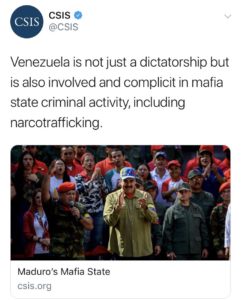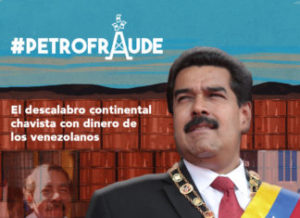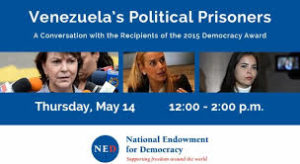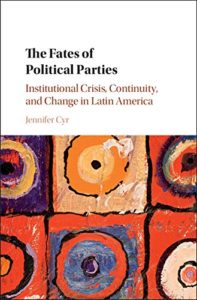
It’s been four months since Venezuela’s National Assembly declared its president, Juan Guaidó, interim president. He would constitutionally succeed President Nicolás Maduro (2013-present), whose 2018 re-re-election has been widely seen as fraudulent, note analysts Jessica Maves Braithwaite. The increasingly authoritarian Maduro refuses to step down, despite widespread protests. Which raises the prospect of four scenarios, they write for the Washington Post:
Scenario #1. Maintain the status quo: The Maduro regime currently confronts its opponents in a targeted way, arresting opposition figures and stripping legislators of their powers. But it is difficult to see how the status quo is sustainable. Venezuelans are barely scraping by. Given Maduro’s ostensible weakness and an international community broadly supportive of change, one of the following scenarios is likely to unfold.
Scenario #2. Escalated crackdowns: The Maduro regime might decide, as a last-ditch effort to retain control, to indiscriminately arrest opponents, ban public gatherings and respond violently to public dissent. Political scientists would argue that this coercive approach reduces the probability of democratization in the immediate future. In the longer term, however, the costs of repression may outweigh the benefits, …..
Scenario #3. Popular uprising, leading to regime change: Guaidó’s April 30 call for a popular uprising failed, but something like this might succeed in the future. If the government engages in widespread and indiscriminate repression (Scenario #2), we could see increased outrage and public backlash resulting in greater anti-regime mobilization in the streets….
 Scenario #4. Maduro’s ouster via negotiated transition: Reform-minded chavistas might decide to coordinate with opposition moderates to create a transitional government that oversees new elections. By some accounts, this scenario was already being negotiated behind Maduro’s back in April. The call by Guaidó and López for a popular uprising on April 30 upended those talks. In May, renewed talks in Norway — this time with the blessing of both Guaidó and Maduro — were, once again, underway.
Scenario #4. Maduro’s ouster via negotiated transition: Reform-minded chavistas might decide to coordinate with opposition moderates to create a transitional government that oversees new elections. By some accounts, this scenario was already being negotiated behind Maduro’s back in April. The call by Guaidó and López for a popular uprising on April 30 upended those talks. In May, renewed talks in Norway — this time with the blessing of both Guaidó and Maduro — were, once again, underway.
The only way to get rid of Maduro and to move toward free elections and begin new policies that mitigate the lethal crisis that is currently annihilating so many Venezuelans is through negotiations, argues Moisés Naím, a distinguished fellow at the Carnegie Endowment for International Peace:
Venezuelan society has already learned that talks, up until now, have been a ruse and should not be naïvely accepted. The democratic international community does not believe Maduro either, and demands concrete actions to reduce the distrust they have good reason to have in him. It is also true that in previous dialogues the opposition was weaker and more disorganized. It did not have the support of 54 countries, and the Maduro regime was not as vulnerable as it is now.
 Expecting Maduro and his cronies to participate in talks without lying and trying to trick the opposition and the world into believing in promises that they don’t intend to keep may be naïve, adds Naím, a former NED board member. But perhaps even more naïve is to expect that, in Venezuela, it is possible to avoid political dialogue indefinitely.
Expecting Maduro and his cronies to participate in talks without lying and trying to trick the opposition and the world into believing in promises that they don’t intend to keep may be naïve, adds Naím, a former NED board member. But perhaps even more naïve is to expect that, in Venezuela, it is possible to avoid political dialogue indefinitely.
Spain’s Repsol, the last western oil giant with major operations in Venezuela, is leaving the embattled country, as pressure mounts from U.S. sanctions and continuing unrest, VOA’s Martin Arostegui reports:
 Repsol’s investments in Venezuela, valued at nearly $1.7 billion (1,480 billion euros) in 2017, have fallen 70% over the past year. The company’s annual report also says the firm will continue winding down its Venezuelan business in the next few months….U.S. special envoy for Venezuela Eliot Abrams recently said during a visit Madrid, that “Repsol’s business in Venezuela is under very active discussion in Washington” where the company applied for special exemptions for its remaining joint ventures with the Venezuela’s national oil company PDVSA.
Repsol’s investments in Venezuela, valued at nearly $1.7 billion (1,480 billion euros) in 2017, have fallen 70% over the past year. The company’s annual report also says the firm will continue winding down its Venezuelan business in the next few months….U.S. special envoy for Venezuela Eliot Abrams recently said during a visit Madrid, that “Repsol’s business in Venezuela is under very active discussion in Washington” where the company applied for special exemptions for its remaining joint ventures with the Venezuela’s national oil company PDVSA.
Change seems imminent in Venezuela. How change occurs will affect the short- and longer-term prospects for democracy, according to Cyr, associate professor of political science and Latin American studies at the University of Arizona and author of “The Fates of Political Parties: Institutional Crisis, Continuity, and Change in Latin America”, and Braithwaite, assistant professor of political science at the University of Arizona.







